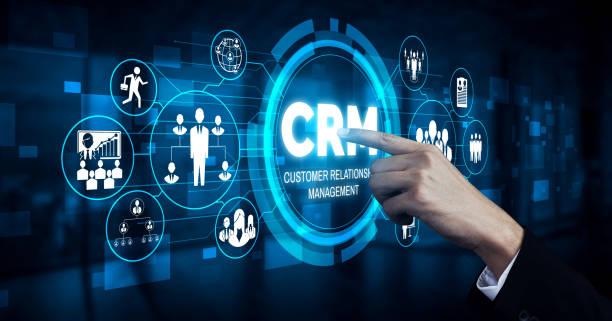What does CRM stand for in Digital Marketing? CRM stands for Customer Relationship Management and refers to a technology used to manage customer interactions. This technology helps businesses stay in touch with customers and improve profitability.
A CRM solution will allow businesses to focus on relationships – with customers and individual employees. It can also help organizations measure and monitor success by measuring customer satisfaction and loyalty. To learn more about CRM, read on.
CRM is a vital tool for businesses
It helps businesses understand and respond to the needs of their customers. Understanding the needs of your existing customers is the key to developing a strong customer base. This will enable you to build a loyal customer base and stay competitive in today’s marketplace.
Using a CRM will help you interact with your existing customers and gather data that will help you improve your products and services. CRM can automate a range of tasks in your company, from basic website activity to mass mailings and phone calls.
The newest CRM adoptions are social media sites such as Twitter and Facebook
These channels are crucial for increasing your reputation and bottom line. This technology enables you to keep in touch with your existing customers, which is essential for continued success. It is important to remember that building new customer lists can be expensive.
So, if you want to increase your bottom line, you should make use of this technology. CRM software can be used by anyone with a business. It can be used by marketing teams, support and service departments, nonprofit organizations, and even editorial teams.
But CRM is not just for companies
It can be useful for nonprofits, startups, art projects, and non-profits. If your business is geared toward a particular demographic, you can benefit from this technology. If your target audience has a specific need for a product or service, your CRM will help you address those needs.
In digital marketing, CRM is a tool that can help you understand your customers and what they want. It helps you create personalized campaigns that are tailored to your customers’ needs and desires. A CRM is also essential for maintaining customer loyalty.

What Does CRM Stand For in Digital Marketing?
It allows you to maintain and build a loyal customer base, which is critical for success
The right CRM solution can boost your profits by helping your customers stay happy and satisfied. And, it makes it easier to understand your customers and your competitors. The first part of a successful digital marketing campaign is the customer relationship.
In digital marketing, CRM creates a solid foundation for sales and promotion. It is a collection of applications designed to help manage customer databases, leads, and overall satisfaction. A firm’s customer relationship is the key to boosting sales.
Ultimately, CRM can help your customer relationships
Keeping in touch with your customers is essential for business success. With customer relationships in mind, a CRM system helps you keep track of all customer interactions. Your audience will feel more appreciated and able to buy from you.
As a result, the CRM will help you increase sales and improve customer satisfaction. And if you’re trying to boost your revenue, it’s vital to keep in touch with your customers. In digital marketing, CRM is an important piece of any strategy.
CRM is a technology that helps companies manage their customer relationships
By using CRM, businesses can maintain better customer relationships and increase sales. It also helps businesses manage their leads and contact information. In this way, the customer’s experience is more personalized. It is vital to keep in touch with the consumer in any way possible.
Once your relationship with customers is good, the sales will follow. And if you can get a better customer experience, you’ll be more likely to succeed.
Customer relationship management is the foundation of any digital marketing strategy
It is the cornerstone of digital marketing and provides a solid platform for promotion and sales. With a CRM, your customer data is individualized and stored in segments, making it easier for sales and service.
And that’s just the start of the possibilities. Customer relationship management is a crucial component of a digital marketing strategy. It’s a crucial part of the overall marketing strategy.
What Are the Types of CRM in Digital Marketing?
CRM stands for Customer Relationship Management, and there are many different types available. 360-degree Customer View is a comprehensive view of a customer. This includes details such as their contact information, past interactions, campaign history, and more.
This type of CRM can handle complex business processes and thousands of users, and is perfect for companies looking to make their customers feel important. It can also be used to track analytics and navigation.
There are four main types of CRM for digital marketing: collaborative CRMs and analytical CRMs
The first type emphasizes interactions between vendors and distributors. The second type is called campaign management CRM, which combines analytical and operational CRMs to help manage marketing campaigns. Strategic CRMs are focused on the customer and help the business make better decisions.
Operational CRMs are used to improve communication between sales and marketing departments
Operational CRM is used for managing and maintaining contacts. It helps companies identify prime consumers and their preferences, and automate outgoing email and messaging.
This type of CRM is ideal for managing customer support. It allows the team to track every interaction and pick up where they left off when addressing an issue. A CRM is the most beneficial tool for digital marketing. You can also use it to create automated and personalized customer support.
Operational CRMs support the sales and marketing teams
They help them automate processes and use historical data to make better decisions. It also helps to improve the overall customer experience. This type of CRM is suitable for companies that have a short sales cycle and a high rate of repeat sales.
Meanwhile, collaborative CRMs share internal customer data with external companies to make it easier to collect information on the customer. This type of CRM is more common in markets with high levels of innovation and competitiveness.

What Does CRM Stand For in Digital Marketing?
Collaboration-based CRMs are best for high-level strategizing
They let employees share data and collaborate with other departments. In addition to increasing efficiency, these types of CRMs can also improve processes across customer-facing departments.
In general, the types of CRMs in digital marketing can help businesses grow and stay competitive. They can help businesses stay ahead of the competition. And they can make better decisions.
-Analytical CRMs focus on interaction between businesses and customers
These CRMs can help businesses tailor their campaigns to a particular audience. This type of CRM allows the marketers to tailor their campaigns to suit each consumer.
By analyzing a customer’s behavior and buying habits, they can create a better product and service. The types of CRM in digital marketing are diverse. The main difference is their purpose.
-Operational-CRMs: These CRMs help businesses manage and analyze data
They provide business owners with a comprehensive view of their customers and the processes they use. This is a must-have feature in any CRM. These systems are often used by marketing teams to customize campaigns.
The types of CRM in digital marketing are vast and varied. A strategic CRM would help you monitor all these aspects and make more informed decisions.
-Analytical CRMs
The type of CRM in digital marketing can help businesses analyze their data. It is essential for business success. Having accurate and useful data helps companies track and improve their customer service. The analytical CRMs can also improve the customer’s experience.
It will allow them to track the buyer’s journey. This will help them to determine the best course of action. The collaborative type of CRM can be the best tool for improving customer service.
-Collaborative CRMs
The analytical CRM will let you log all your interactions with customers. In addition to this, it will help you manage and analyze data in real time. Apart from managing data, CRMs can also help you optimize the efficiency of your employees and customers.
So, it is important to choose the type of CRM that best fits your business needs. There are several types of CRM. This will depend on your business goals. For homepage click here

